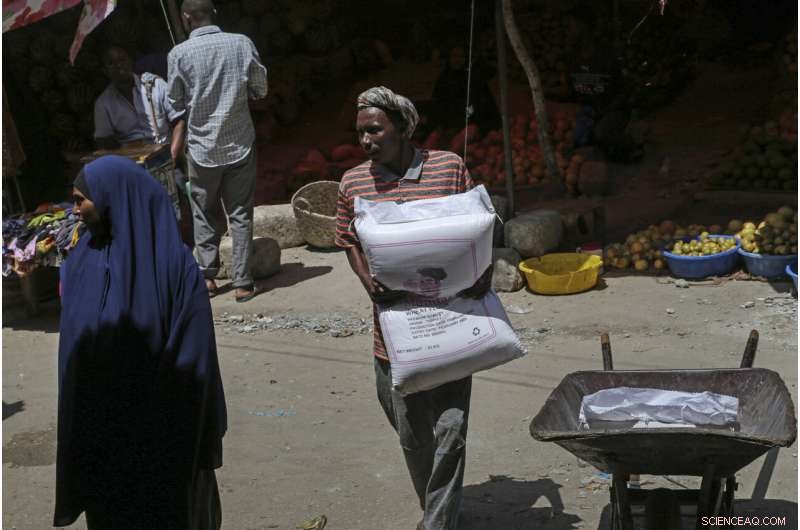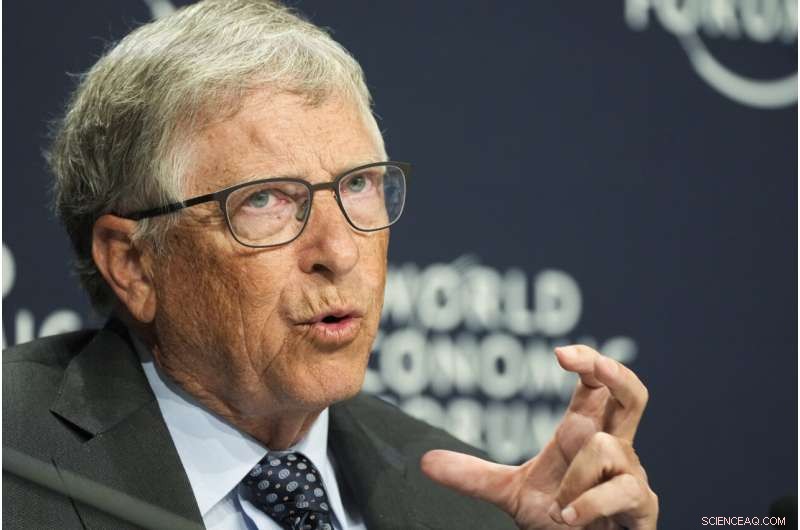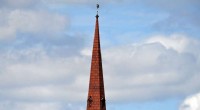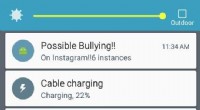
Wetenschap
Bill Gates:technologische innovatie zou honger helpen oplossen

Een man draagt een zak tarwebloem geïmporteerd uit Turkije op de Hamar-Weyne-markt in de hoofdstad Mogadishu, Somalië Donderdag 26 mei 2022. Bill Gates drong er bij wereldleiders op aan om de doelen die ze hadden gesteld om honger en armoede te verminderen, niet op te geven, ondanks enorme recente tegenslagen gedocumenteerd in een nieuw rapport dat dinsdag 13 september is vrijgegeven door The Bill and Melinda Gates Foundation. Krediet:AP Photo/Farah Abdi Warsameh, Bestand
Bill Gates zegt dat de wereldwijde hongercrisis zo immens is dat voedselhulp het probleem niet volledig kan aanpakken. Wat volgens Gates ook nodig is, zijn de soorten innovaties in landbouwtechnologie die hij lang heeft gefinancierd om te proberen de crisis te keren die is gedocumenteerd in een rapport dat dinsdag is vrijgegeven door The Bill and Melinda Gates Foundation.
Gates wijst in het bijzonder op een doorbraak die hij 'magische zaden' noemt, gewassen die zijn ontwikkeld om zich aan te passen aan klimaatverandering en weerstand te bieden aan landbouwongedierte. De Gates Foundation heeft dinsdag ook een kaart vrijgegeven die modelleert hoe klimaatverandering waarschijnlijk de groeiomstandigheden voor gewassen in verschillende landen zal beïnvloeden om de dringende noodzaak van actie te benadrukken.
Door technologie een vooraanstaande rol toe te kennen bij het aanpakken van de voedselcrisis in de wereld, plaatst Gates zichzelf op gespannen voet met critici die zeggen dat zijn ideeën in strijd zijn met wereldwijde inspanningen om het milieu te beschermen. Ze merken op dat dergelijke zaden over het algemeen pesticiden en op fossiele brandstoffen gebaseerde meststoffen nodig hebben om te groeien.
Critici beweren ook dat de aanpak van Gates de urgentie van de crisis niet aanpakt. Het ontwikkelen van "magische zaden" duurt jaren en zal niet onmiddellijk verlichting bieden aan landen die momenteel wijdverbreid lijden te verduren hebben omdat ze afhankelijk zijn van voedselimport of historische droogtes ervaren.
Het is een debat dat de internationale druk zou kunnen vergroten om de gedeelde doelen voor wereldwijde welvaart en vrede te bereiken, bekend als de VN-doelstellingen voor duurzame ontwikkeling, vóór een deadline van 2030. De 17 doelen omvatten het beëindigen van armoede en honger, het bestrijden van klimaatverandering, toegang tot schoon water, werken aan gendergelijkheid en het verminderen van economische ongelijkheid.
"Het is vrij somber in vergelijking met onze hoop voor 2030", zei Gates, 66, in een interview met The Associated Press. Hij voegde er echter aan toe:"Ik ben optimistisch dat we weer op het goede spoor kunnen komen."
Gates wees op de oorlog in Oekraïne en de pandemie als de belangrijkste oorzaken van de verergerende hongercrisis. Maar zijn boodschap aan andere donoren en wereldleiders die in september voor de Algemene Vergadering van de VN bijeenkomen, is dat voedselhulp niet genoeg zal zijn.
"Het is goed dat mensen willen voorkomen dat hun medemensen verhongeren als conflicten zoals Oekraïne de voedselvoorziening onderbreken", schrijft Gates in het nieuwe rapport. Maar het echte probleem, zegt hij, is dat veel landen met voedselonzekerheid niet genoeg van hun eigen voedsel produceren - een probleem dat zeker zal worden verergerd door de gevolgen van klimaatverandering.
"De temperatuur blijft stijgen", zei Gates. "Er is geen manier om, zonder innovatie, zelfs maar in de buurt te komen van het voeden van Afrika. Ik bedoel, het werkt gewoon niet."
Zoals hij al meer dan 15 jaar doet, riep Gates op tot investeringen in landbouwonderzoek, waarbij hij de nadruk legde op maïszaden die gedijen bij hogere temperaturen en in drogere omstandigheden dan andere variëteiten. Die zaden zijn ontwikkeld in het kader van een programma van de African Agricultural Technology Foundation waaraan de stichting sinds 2008 $ 131 miljoen heeft gegeven.
Sindsdien heeft de Gates Foundation $ 1,5 miljard uitgegeven aan subsidies gericht op landbouw in Afrika, volgens Candid, een non-profitorganisatie die onderzoek doet naar filantropische schenkingen. De Bill and Melinda Gates Foundation is in sommige opzichten de grootste particuliere stichting ter wereld en staat vooral bekend om haar werk op het gebied van wereldwijde gezondheid, inclusief vaccins. Het begon in zijn huidige vorm in 2000, nadat Gates zijn CEO-positie bij Microsoft, de techgigant waarvan hij medeoprichter was, had verlaten. Forbes schat zijn vermogen op ongeveer $ 129 miljard.
The foundation's spending on agricultural development is why Gates' view on how countries should respond to food insecurity has taken on heightened importance in a year when a record 345 million people around the world are acutely hungry. The World Food Program said in July that tally represents an increase of 25% from before Russia invaded Ukraine in February and a 150% jump from before the pandemic struck in the spring of 2020.
In Ghana, field trials for four varieties of modified seeds began in 2013. But only this past summer has one been approved for commercialization, said Joeva Rock of the University of Cambridge. Activists there, she said, have asked whether those resources could have been better spent elsewhere.
"What would happen if those went into increasing funds to the national research centers in Ghana, to building roads, to building storage, to building silos or helping to build markets?" said Rock, who has written a book about food sovereignty in the country.
When asked, Gates acknowledged the importance of infrastructure like roads and other transportation systems.
"If you want your inputs like fertilizer to come in, if you want your output to go out, it's just too expensive in Africa without that infrastructure," he said, adding that building and maintaining roads is highly expensive.

Bill Gates, Co-Chair, Bill &Melinda Gates Foundation, speaks at a news conference during the World Economic Forum in Davos, Switzerland, Wednesday, May 25, 2022. Gates urged world leaders not to give up on the goals they set to reduce hunger and poverty despite huge recent setbacks documented in a new report released Tuesday, Sept. 13 by The Bill and Melinda Gates Foundation. Credit:AP Photo/Markus Schreiber, File
Some researchers question the wisdom of pursuing the fundamental premise that Gates has embraced:Increasing agricultural production through the use of modified seeds along with fertilizers and pesticides. They point to the environmental footprint of industrial agriculture, including the use of fossil fuel-based fertilizers, the degradation of soil quality and the diminishing of biodiversity.
Alternatives could include agroecological interventions, like developing locally managed seed banks, composting systems to promote soil health and pesticide interventions that don't rely on chemicals, experts said. Over time, those approaches can reduce the need for food aid and build more resilient farming systems, according to Rachel Bezner Kerr, a professor of global development at Cornell University.
Kerr, a lead author of the food chapter of the latest report from the International Panel on Climate Change, said that while the panel doesn't make recommendations, "overall, the kind of focus on a few technologies and reliance on fossil fuel-based inputs isn't in line with ecosystem-based adaptation" or a biodiverse future.
Mark Suzman, CEO of the Gates Foundation, defends its approach warning that limiting access to fertilizers means farmers cannot increase their yields.
"Fertilizer is necessary. You simply cannot meet the overall productivity gains without it," Suzman said, speaking on a call with reporters.
In his interview with the AP, Gates himself dismissed criticisms of the foundation's emphasis on modified seeds.
"If there's some non-innovation solution, you know, like singing 'Kumbaya,' I'll put money behind it," Gates said. "But if you don't have those seeds, the numbers just don't work." He added, "If somebody says we're ignoring some solution, I don't think they're looking at what we're doing."
Another project the foundation has funded is the development of computer models that try to measure crop loss caused by disease or pests. The idea is to direct research and responses to where they are needed most.
"It's not just, how do we get through this crisis and get back to normal? It's, what does the future normal look like?" said Cambria Finegold, the director of digital development for CABI, an intergovernmental nonprofit that is developing the models.
Melinda French Gates, the other co-chair of the Gates Foundation, highlighted in a separate letter the halting progress toward gender equity worldwide. Since January, the foundation has expanded its board, adding six new members to help direct its work, a move that followed the announcement of the Gateses' divorce last summer.
French Gates has agreed to step down after two years if the two decided they could not continue to work together. French Gates, who also founded an investment organization called Pivotal Ventures, was not available for an interview.
Gates said he is lucky that his former wife has continued to put her time and energy into the foundation. In July, Gates said he would contribute $20 billion to the foundation in response to the significant setbacks caused by the pandemic, raising its endowment to approximately $70 billion.
Through his giving, investments and public speaking, Gates has held the spotlight in recent years, especially on the topics of vaccines and climate change. But he has also been the subject of conspiracy theories that play off his role as a developer of new technologies and his place among the highest echelons of the wealthy and powerful.
Gates said he does not spend time thinking about conspiracies and that his foundation's work has nothing to do with his personal reputation.
"If you go into these countries, they've never heard of me or the foundation," Gates said. "Maybe in the rich world somebody is reading some internet thing, but the people we care about have never, will never, and it's not important that they ever know who I am." + Verder verkennen
Gates:Foundation to invest $5B in Africa over next 5 years
© 2022 The Associated Press. Alle rechten voorbehouden. Dit materiaal mag niet worden gepubliceerd, uitgezonden, herschreven of opnieuw verspreid zonder toestemming.
 MOF's kunnen lastige gassen detecteren en sorteren
MOF's kunnen lastige gassen detecteren en sorteren Chemische stoffen in alledaagse producten screenen op veiligheid - zonder dieren
Chemische stoffen in alledaagse producten screenen op veiligheid - zonder dieren Sterke M-M Pauli-afstoting leidt tot weerzinwekkende metalophiliciteit
Sterke M-M Pauli-afstoting leidt tot weerzinwekkende metalophiliciteit Uit dikke lucht:kooldioxide omzetten in lichtemitterende koolstof
Uit dikke lucht:kooldioxide omzetten in lichtemitterende koolstof Wat zijn twee soorten verdamping?
Wat zijn twee soorten verdamping?
 Aanpassingen van een Macaroni-pinguïn
Aanpassingen van een Macaroni-pinguïn  Extreme plotselinge droogtes zullen in de toekomst aanhouden
Extreme plotselinge droogtes zullen in de toekomst aanhouden Onderzoek toont aan dat het ijsverlies van Thwaites Glaciers niet zo snel verloopt als gedacht
Onderzoek toont aan dat het ijsverlies van Thwaites Glaciers niet zo snel verloopt als gedacht Een goedkope oplossing om arseen uit drinkwater te verwijderen
Een goedkope oplossing om arseen uit drinkwater te verwijderen Oude boeren hebben ons gespaard van gletsjers, maar hebben het klimaat op aarde ingrijpend veranderd
Oude boeren hebben ons gespaard van gletsjers, maar hebben het klimaat op aarde ingrijpend veranderd
Hoofdlijnen
- Tonnen leven diep in het aardoppervlak gevonden
- Duurzaamheid van visserij gekoppeld aan genderrollen onder handelaren
- Ideeën voor een Sunscreen Science Fair Project
- Bewaking op afstand helpt bij het vinden van oplossingen voor crapemyrtle bark scale
- Wetenschappers ontwikkelen nieuwe techniek om het verborgen genoom te onthullen
- Wat is het belang van nucleïnezuren?
- Een JELL-O-model van een diercel maken
- Een plantencel maken uit gerecycleerde materialen
- 10 geweldige dingen die de hersenen van mensen hebben gedaan
- Britse kerktorens gebruikten om telefoon te stimuleren, wifi signaal

- Taxichauffeurs in Barcelona gaan rechtszaak aan tegen Uber

- Efficiëntere beveiliging voor machine learning in de cloud

- Google presenteert AI-vooruitgang op zijn grote conferentie

- Cyberpesten onderdrukken:nieuwe aanpak is snel, nauwkeurig

 Berekening Superelevation berekenen
Berekening Superelevation berekenen Wat zijn de overeenkomsten tussen eierdoppen en tanden?
Wat zijn de overeenkomsten tussen eierdoppen en tanden?  Duizenden vast op door vuur omringde stranden in Australië
Duizenden vast op door vuur omringde stranden in Australië Nieuw supergeleidend qubit-testbed komt de ontwikkeling van kwantuminformatiewetenschap ten goede
Nieuw supergeleidend qubit-testbed komt de ontwikkeling van kwantuminformatiewetenschap ten goede Tunnelen onder Stonehenge - de effecten van stadsuitbreiding
Tunnelen onder Stonehenge - de effecten van stadsuitbreiding ster explodeerde, overleefd, en explodeerde meer dan 50 jaar later opnieuw
ster explodeerde, overleefd, en explodeerde meer dan 50 jaar later opnieuw 10 eenvoudige wetenschapsprojecten
10 eenvoudige wetenschapsprojecten  Wetenschappers bereiken grote doorbraak in behoud van integriteit van geluidsgolven
Wetenschappers bereiken grote doorbraak in behoud van integriteit van geluidsgolven
- Elektronica
- Biologie
- Zonsverduistering
- Wiskunde
- French | Italian | Spanish | Portuguese | Swedish | German | Dutch | Danish | Norway |

-
Wetenschap © https://nl.scienceaq.com

